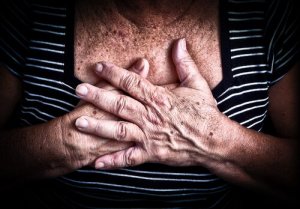Recommendations Regarding COVID-19 for Patients With Cardiovascular Disease


Written and verified by the nurse Maria Marin Garcia
Today, there’s growing concern among patients who suffer from cardiovascular disease in light of the current pandemic. The American Heart Association (AHA), the American College of Cardiology (ACC), the Centers for Disease Control and Prevention (CDC) and other organizations have established recommendations regarding COVID-19 for cardiovascular patients and provide more information on this new and unfamiliar infection.
Right now, experts are unsure if heart disease facilitates contagion. But what we do know is that patients with cardiovascular disease have a worse prognosis. However, advanced age continues to be the biggest factor associated with an adverse prognosis.
With all of this in mind, it’s especially important to exercise extreme caution in order to reduce the risk of contagion. The most important of all is to stay home. The following article will present the information available to date as well as current recommendations for cardiovascular disease regarding COVID-19. Keep reading in order to discover more.
How does COVID-19 affect patients with cardiovascular disease?
Coronavirus has the potential to infect any person, regardless of his or her state of health. It’s true that the elderly and/or those with a chronic condition are more vulnerable to the disease. However, this doesn’t mean that they’re going to catch the virus or that, in the case of infection, it will become serious.
COVID-19 can also develop asymptomatically. In other words, we can experience the infection without even realizing it, or with only mild symptoms. However, it’s important to practice measures of control in order to protect those who are most at risk. An ounce of prevention is still better than a pound of cure. In other words, better safe than sorry.
Every case of infection is a burden on your heart, forcing it to work harder than usual. Therefore, if a person already suffers from a preexisting cardiovascular disease, an infection can cause his or her heart to function even worse. The heart doesn’t have the strength to pump blood to the rest of the body and this produces an accumulation of liquid in the lungs.
The liquid in the lungs will impede patients from breathing normally and being able to perform gas exchange correctly. As a result, the possibility of complications and pneumonia increases.
What’s more, infection by COVID-19 can produce direct damage to the heart muscle, producing swelling and compromising its function. This condition is known as myocarditis and can worsen a patent’s prognosis.

You may also want to read: Is it True that Coronavirus Affects Men More than Women?
What risk do patients with cardiovascular disease have of contracting COVID-19?
As we can expect, the risk of contracting coronavirus depends on a person’s exposure to other infected individuals. As we’ve stated, experts are unsure whether or not cardiovascular disease facilitates the spread of COVID-19. Just the same, it doesn’t seem likely.
Therefore, it’s important to follow certain recommendations for cardiovascular patients regarding COVID-19. The main objective is to avoid increasing the risk of suffering more complications on top of the preexisting illness.
The most influential factor in the prognosis and evolution of infected individuals is age. The elderly are more vulnerable because our immune system becomes weaker with time. If, on top of this, we add the existence of chronic heart disease, the risk to a person’s health is greater.
Unfortunately, individuals over the age of 60 are more at risk of suffering more serious forms of this infection. When it comes to individuals over the age of 80, the risk is even greater.
Keep reading: Coronavirus Spreads More Easily in Certain Environments
What recommendations regarding COVID-19 exist for cardiovascular patients?
In the case of patients that suffer from cardiovascular disease, the following recommendations apply:
- Continue treatment, and don’t forget to take your medication daily. No medication for the treatment of cardiovascular disease is harmful in the case of contagion.
- It’s important to have sufficient medication at home and to renew prescriptions without leaving the house. Talk with the doctor that prescribed your medication about obtaining a larger supply. Furthermore, look into the possibility of having medication delivered directly to your home.
- Avoid the excessive intake of liquids and limit salt.
- Be careful about what you eat. A healthy diet is one of the most important factors.
- Perform cardiovascular exercises while at home: Walk, dance, pedal… Perform strength, balance, and flexibility (stretching) exercises.
- Get the rest and sleep you need. This is fundamental in allowing your heart muscles to recover from one day to the next.

Measures to prevent contagion
Of course, it goes without saying that you should know and practice general preventative measures to avoid contracting COVID-19:
- Stay home: Confinement is the safest way to prevent contagion.
- Wash your hands often with soap and water for more than 20 seconds.
- Limit social activity: Avoid close contact with other people. This means maintaining a distance of 3 to 6 feet.
- Wash and disinfect surfaces that other people have been in contact with. Studies have shown that bleach is an effective disinfectant because it deactivates the virus.
- In the case of any alarming symptoms, talk to your doctor by phone. If symptoms are serious, call the emergency services.
- When coughing or sneezing, cover your mouth or nose with the inside of your bent arm.
- Use disposable tissues and throw them away after use.
- Avoid touching your eyes, nose, and mouth, as hands facilitate the transmission of the virus.
- Use a mask when you leave your home, even if you don’t have symptoms. If you have symptoms or have tested positive for coronavirus, you should use a mask at home as well in order to keep other members of your household safe.
When should I talk to a doctor?
If you experience any signs or symptoms that cause you to suspect any change in your body, be sure to talk to a health professional. Especially in the case of the following:
- Fever, cough, and shortness of breath (fatigue or difficulty breathing)
- Pain or pressure in the chest
- Bluish lips
- Gastrointestinal symptoms: Nausea, vomiting, diarrhea, lack of appetite
- Overall discomfort: Having the chills or experiencing generalized muscular pain
- Loss of the sense of taste or smell
- Headache
All cited sources were thoroughly reviewed by our team to ensure their quality, reliability, currency, and validity. The bibliography of this article was considered reliable and of academic or scientific accuracy.
- Especial coronavirus – Información de la FEC acerca del COVID-19 – Fundación Española del Corazón. (n.d.). Retrieved April 10, 2020, from https://fundaciondelcorazon.com/covid-19.html
- Confinamiento, D. (n.d.). GUIA DE ACTUACIÓN PARA PERSONAS CON CONDICIONES DE SALUD CRÓNICAS Y PERSONAS MAYORES EN SITUACIÓN. Retrieved April 10, 2020, from www.mscbs.gob.es
- Cinco recomendaciones para pacientes con enfermedad cardiovascular en el contexto de pandemia por la COVID-19 – semFYC. (n.d.). Retrieved April 10, 2020, from https://www.semfyc.es/cinco-recomendaciones-para-pacientes-con-enfermedad-cardiovascular-en-el-contexto-de-pandemia-por-la-covid-19/
- Especial coronavirus – Información de la SEC acerca del COVID-19 – Sociedad Española de Cardiología. (n.d.). Retrieved April 10, 2020, from https://secardiologia.es/covid-19
- GUIA DE ACTUACIÓN PARA PERSONAS CON CONDICIONES DE SALUD CRÓNICAS Y PERSONAS MAYORES EN SITUACIÓN DE CONFINAMIENTO. (n.d.). Ministerio de Sanidad. Retrieved April 10, 2020, from https://www.mscbs.gob.es/profesionales/saludPublica/ccayes/alertasActual/nCov-China/documentos/CRONICOS20200403.pdf
This text is provided for informational purposes only and does not replace consultation with a professional. If in doubt, consult your specialist.








